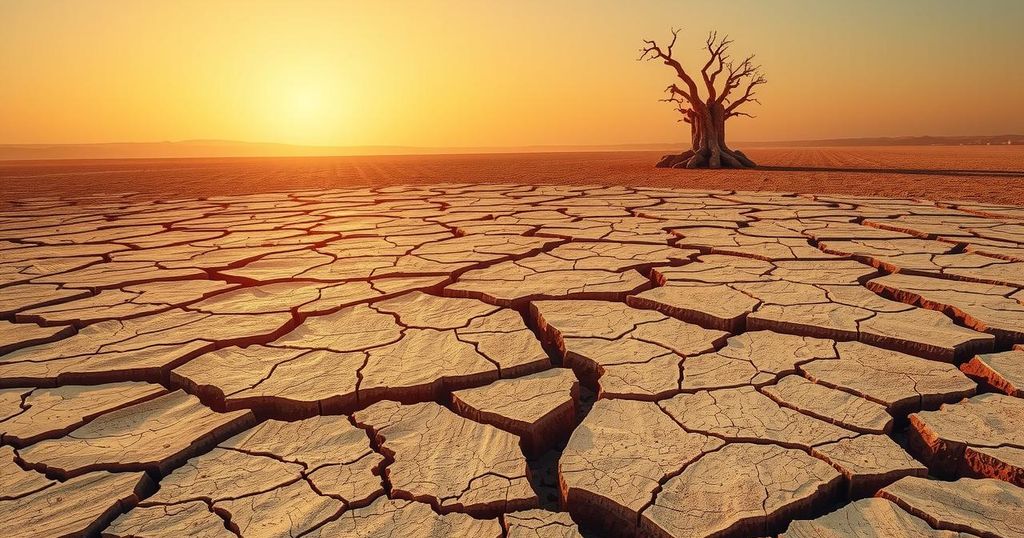Africa, while contributing only 4% to global carbon emissions, faces dire consequences from climate change, necessitating adaptation costs of $30-$50 billion annually, a sum many nations cannot afford. The continent is vulnerable due to socio-political unrest and governance issues, exacerbating the impact of climate crises on its development. To mitigate these challenges, Africa must enhance institutional capacity, improve governance, and attract climate finance while pursuing sustainable development.
Africa finds itself grappling with the dire effects of climate change, a problem it had little role in creating. Despite generating only 4% of global carbon emissions, the continent faces significant challenges as it strives for development while contending with the severe consequences of climate shifts, which threaten its progress and stability.
The economic demands to adapt to climate changes are staggering, with estimates suggesting costs between $30 billion and $50 billion annually, far exceeding the financial capabilities of many African nations. Various obstacles, including mounting debt and limited technological advancements, hinder even the most capable states from effectively confronting these challenges, leaving them vulnerable.
Africa’s population, currently at 1.5 billion and expected to double by 2070, further complicates the situation. Unfortunately, the continent attracts merely $53 billion in foreign investment, which is only 4% of the global total. This paradox highlights Africa’s abundant natural resources, yet the continent suffers disproportionately from climate change impacts.
Historical patterns reveal that industrialized nations previously grew with minimal regard for environmental cost while Africa is paying the price now. The expectation that environmental degradation would improve with wealth, as indicated by Simon Kuznets’ Environmental Curve, does not apply to Africa, which faces immediate repercussions for external decisions made long ago.
The continent is already experiencing climatic disasters, with extreme weather events costing between 2% to 5% of GDP annually. According to the UN Economic Commission for Africa, 17 out of the 20 most vulnerable countries to climate change are situated in Africa, underscoring the urgent need for effective adaptation strategies amidst these challenges.
Social and political unrest further compounds the difficulties faced by the continent. In 2024, youth-led protests erupted across various nations in response to governance failures and economic struggles, reflecting deep-rooted frustrations regarding insufficient leadership and corruption. This unrest signals a growing demand for accountability and change among African citizens.
As Sir Mo Ibrahim articulates, “Unmet expectations, especially for young people, fuel frustration and anger—the best triggers for unrest and conflicts.” This phrase encapsulates the sentiment that dissatisfaction among youth is likely to escalate if systemic issues persist, thus stalling necessary economic and environmental reforms.
Despite acknowledging these challenges, Africa’s critical obstacle is not solely climate change but rather the political dysfunction that impedes effective adaptation and transformation. Years of mismanagement and corruption have resulted in severe deficits in the continent’s ability to mobilize resources for meaningful change.
While wealthier nations promised to provide $100 billion annually for climate action in developing regions, they only recently met this commitment—far too late for many African nations. Moreover, the allocated amounts continue to fall short of the estimated $580 billion needed for adaptation between 2020 and 2030, highlighting a significant financial gap.
This article examines the disproportionate impact of climate change on African nations, which contribute minimally to the global problem while facing severe consequences. It discusses Africa’s economic challenges in adapting to climate impacts, the effects of a rapidly growing population, and the internal struggles related to governance and resource management. The narrative reveals the irony of Africa’s rich resources juxtaposed with its vulnerability to climate disasters and socio-political unrest.
In conclusion, Africa stands at a crossroads, facing the dire consequences of climate change it did not create, yet it must bear the burden of adaptation costs and governance failures. There is an urgent need for systemic changes within African nations to address internal issues alongside global calls for climate justice. Improved governance, transparency, and strategic investments in renewable energies and climate-resilient practices will be pivotal for Africa to safeguard its future and navigate the complex landscape of climate challenges.
Original Source: businessday.ng






